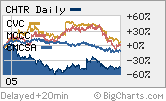 |
| Cable stocks strike out: Despite the buzz behind "triple play" packages, shares of leading cable cos. have flopped during the past year. |
|
 |
| The "carte" before the horse? FCC chairman Kevin Martin said in November that he supported an "a la carte" pricing model for cable, a position that most cable executives don't back. |
|
|
|
|
|
|
|
| More about cable and telecom
|
|
|
|
|
NEW YORK (CNNMoney.com) � It's hard to find an industry more under siege than cable.
Satellite firms DirecTV (Research) and EchoStar (Research) are gunning for their customers, as are the big phone companies like Verizon (Research) and AT&T (Research) (formerly SBC).
Then there are the regulators.
Last week, Federal Communications Commission chairman Kevin Martin said he was in favor of a so-called a la carte cable pricing plan, where consumers could choose to pay only for the channels they specifically wanted.
Many cable executives have maintained that an a la carte model would hurt consumers -- without enough interest in certain niche channels, cable companies might drop them altogether. So giving more freedom to consumers to choose channels could lead to fewer channels being available.
But investors are more worried about cable companies than consumers. They fear that consumers will happily pay less for the few channels they really need, which, of course, means less revenue for the cable companies.
With this in mind, it's no wonder that cable stocks are big losers lately.
The stock price of Comcast (Research), the nation's largest cable firm, has fallen nearly 20 percent this year.
Shares of Charter Communications (Research), the cable company controlled by Microsoft co-founder Paul Allen, are down 43 percent this year, following a 44 percent plunge in 2004. And shares of Mediacom (Research), the nation's eighth largest cable firm, are down more than 15 percent this year, after falling 27 percent last year.
The pronounced downturn in cable valuations has even led some cable companies to take themselves private. Cox Communications, the third largest operator, did so last year and Insight Communications (Research) is currently in the process of doing so. Cablevision (Research) briefly flirted with the idea of going private as well.
Too much doom and gloom?
But is all the pessimism a little overdone? At a discussion in New York hosted by Soleil Securities media analyst Laura Martin Monday night, the chief executive officers of Cox and Mediacom both bemoaned the lack of respect that their industry is currently receiving.
"Cable stocks are cheap as dirt. Equity guys must think telcos are coming in like a steamroller," said Cox CEO Jim Robbins, adding that it will take years for companies like Verizon and AT&T to make major inroads into video. "The doom and gloom is way overblown. These crappy multiples will too pass."
Still, what about the regulatory threat? Mediacom CEO Rocco Commisso dismissed some of the concerns about what a la carte would do to the industry. He said that the biggest problem is not the cable companies but the larger media conglomerates which control the programming.
Commisso said that cable companies like his are often forced to pony up for more channels than they would like from companies like Viacom (Research) and Walt Disney (Research). Some sort of tiered pricing plans (but not a pure channel by channel selection model, per se) could make economic sense, he said.
"It's convenient to blame the distributors but the onus is more on the programmers," Commisso said. "The offers now are limited basic or the full boat and there's nothing in between but we could live with multiple tiers."
Both Robbins and Commisso sang the praises of cable's product breadth, arguing that telecom and satellite-TV firms can't match the so-called triple-play of video, high-speed data and phone services that cable companies offer. What's more, many cable companies will soon have a fourth leg, a quadruple play, in wireless services.
Last month, Comcast, Cox, Time Warner Cable and privately held Advance/Newhouse Communications, which owns cable firm BrightHouse Networks, announced a deal with wireless firm Sprint Nextel (Research) to bring cable services to cell phones beginning next year. (Time Warner Cable is owned by Time Warner (Research), which also owns CNNMoney.com)
"Consumers want what they want, when they want and now where they want," said Robbins, explaining his decision to join in with other cable firms in the Sprint deal.
Can more mergers be a catalyst?
Still, even if the cable industry is just caught in a cycle of bad sentiment, it's not clear what catalysts could get the sector moving again.
"There is a malaise overall. No bullishness," said Commisso. "What will it take to show the Street that cable companies are good assets? I don't know."
One hedge fund manager who owns shares of several cable companies said the industry is probably close to bottoming but it's impossible to predict when the shares will finally begin to bounce back.
"The industry is pretty cheap and the competitive threats are all in the stocks. At some point these stocks all have to rally," the hedge fund manager said. If valuations remain in the doldrums though, he said it wouldn't be a surprise if more investment firms look to take cable companies private.
And it is that, more merger activity, which may be the only thing to get more investors excited in the near-term.
Comcast is currently teaming up with Time Warner to buy the assets of bankrupt cable firm Adelphia Communications (Research). Still, even with Adelphia out of the picture, several other mid-sized cable companies remain that could be ripe to be gobbled up. They include Charter, Mediacom, Insight and privately held Cequel.
Compare that to telecom, where many of the second-tier players have already been acquired.
"Consolidation in the cable industry is almost inevitable and will very much parallel the consolidation we've seen in telecom," said Dan Bergstein, chair of the international telecommunications and media practice group at law firm Paul, Hastings, Janofsky & Walker LLP.
Bergstein said that within the next five to 10 years, many of the smaller players will be scooped up by Comcast, Cox and Time Warner Cable, which is expected to be spun-off sometime in 2006 as a separate publicly traded entity.
Robbins, who is retiring at the end of the year, conceded that more cable mergers would probably take place. But in an apparent job at the phone companies, he cautioned investors to not fall in the trap of believing that bigger is better.
"It's more important to look at the mix of assets and how you can be effective," he said. "Do you have mediocre assets spread throughout the landscape? What's the value of that?"
Cablevision is in favor of a la carte pricing? Click here.
To find out why Cisco is betting on cable equipment, click here.
The reporter of this story owns shares of Time Warner through his company's 401(k) plan.
Sign up to receive the Tech Investor column by e-mail.
Plus, see more tech commentary and get the latest tech news.

|